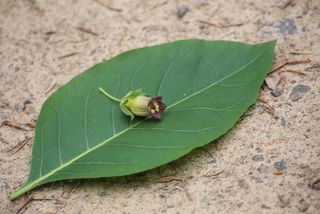A 'Natural' Herb Can be Poisonous, Woman Learns

Herbal remedies that are touted as "natural" may not always be safe, as a new report shows: A woman in the United Kingdom who was trained in using herbs experienced severe symptoms of poisoning after she accidentally overdosed on a medicine called "deadly nightshade."
When the 50-year-old woman was admitted to the emergency department of a hospital in Oxford, England, in September 2014, she was confused and flushed, and her heart rate was faster than normal. Because she was severely agitated, she had to be sedated, and doctors kept her in the intensive care unit overnight.
The woman, who told her doctors that she was a "trained herbalist," received treatment and fully recovered by the following morning.
"In terms of my advice for people, I would say that there is an assumption that everything natural is therefore safe; however, this is not a certainty," said Dr. Andrew Chadwick, a physician at Oxford University Hospitals NHS Trust, who treated the woman and wrote the report of her case. "Indeed, many poisons naturally occur, therefore it is important for people to fully understand the substances they are taking."
The woman had turned to herbs to relieve her insomnia, which she had been suffering from for a while. On the night she was admitted to the hospital, while she was still at home, she could not sleep, so she went downstairs, the woman's husband told her doctors. After hearing a commotion, the husband went downstairs and found his wife giggling and acting as if she were intoxicated, even though she normally abstained from drinking. [How 8 Common Medications Interact with Alcohol]
The man helped his wife to get to bed and went to sleep himself. But he woke up and saw that his wife had left the bed, and had fallen down. This time, she seemed even more confused, so the man called an ambulance, according to the report published today (Nov. 5) in the journal BMJ Case Reports.
Once the woman was admitted to the hospital and treated for her symptoms, she told her doctors that she had recently purchased an herbal remedy made from the poisonous plant Atropa belladonna, commonly named deadly nightshade, to combat her insomnia. On that night, she drank the substance directly from the bottle, which caused her to experience her symptoms, her doctors said.
Sign up for the Live Science daily newsletter now
Get the world’s most fascinating discoveries delivered straight to your inbox.
On the label of the product the woman purchased, it is called "Atropa belladonna Belladonna Leaf," and it can be legally purchased online.
Since the bottle the woman sipped from that night was unopened prior to this incident, her doctors were able to calculate the amount she consumed, which they found to be about 1.7 ounces (50 milliliters).
The doctors estimated that this amount of the liquid contained about 15 milligrams of the chemical atropine, which naturally occurs in the plant. They described this amount as "very large," and said they think it triggered the woman's symptoms.
At high levels, atropine can block signals in the nervous system, "which in turn causes the very fast heart rate, red skin and acute agitation and confusion [as] we saw in our case," Chadwick said.
Exactly how much atropine would be deadly for adults is not known, but between 10 and 20 milligrams of the chemical is incapacitating, according to the report. For children, doses smaller than 10 mg have proven fatal, according to the report.
Chadwick said he was not sure why there was such a high amount of atropine in the small amount of liquid the woman consumed. It is possible the substance is normally supposed to be diluted before consumption, or is supposed to be consumed in very small amounts, such as a teaspoon, he said.
Follow Agata Blaszczak-Boxe on Twitter. Follow Live Science @livescience, Facebook & Google+. Originally published on Live Science.
